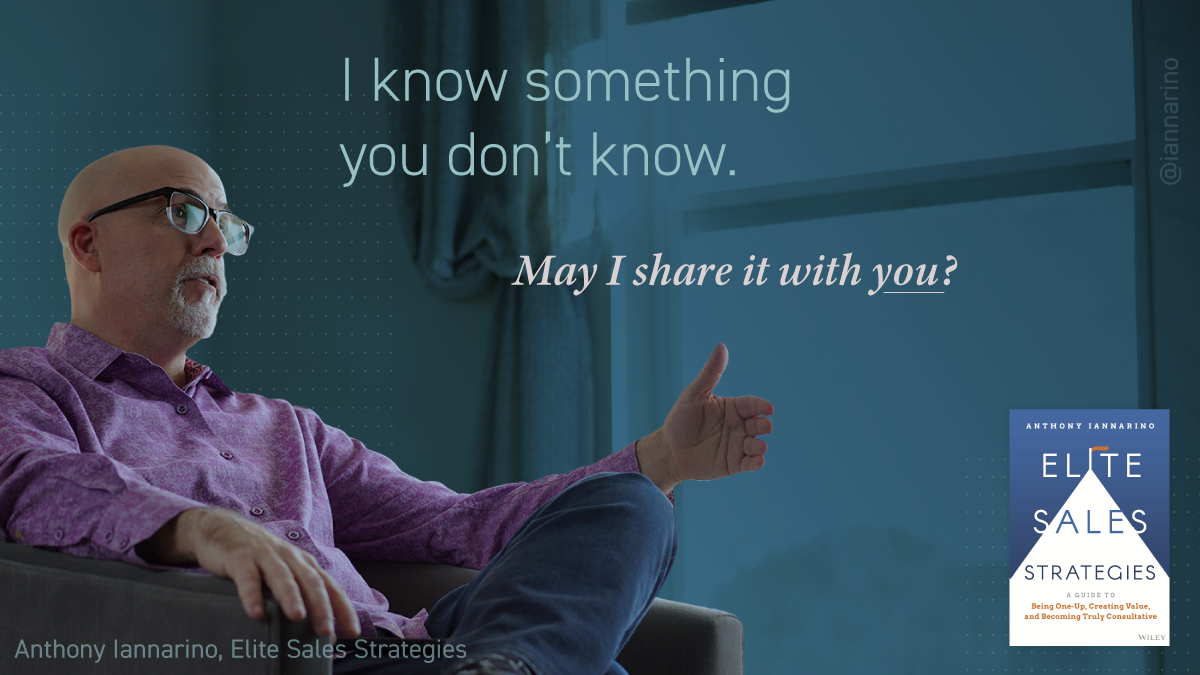The major difference between One-Up salespeople and those presently One-Down is that the One-Up person creates a tremendous value inside the sales conversation, while the One-Down salesperson's approach feels like a waste of time.
The Limits of Being One-Down
The One-Down salesperson uses discovery to pursue two outcomes. The first outcome is to position themselves as credible by answering the question “Why us?" This approach creates anti-value because it wastes time without offering any potential gain. The second desired outcome is to identify the client's problem and their pain. What you will notice about One-Down salespeople is that they ask questions mainly to acquire information from their contacts. The questions benefit the One-Down salesperson without helping the client improve their position.
By talking about their company, their clients, or their products and services, the One-Down salesperson does the opposite of their first objective: they fail to prove they are credible. This legacy approach cannot establish credibility or relevance because most decision makers have experienced it enough to assess whether or not the salesperson can help them. If the decision maker isn’t sure if a sales conversation might be valuable to them, as soon as the One-Down salesperson speaks, they remove any doubt, causing their contact to look at their watch.
"When there is no difference between one meeting and the next, that conversation is a commodity."
The other factor that defines a One-Down salesperson is how they use questions in discovery. They limit their questions to acquiring information and desperately focus on the client's problem and their pain. The One-Down salesperson asks questions to figure out how to suggest that their company's solution is perfect for their prospective client. The reason buyers suggest they no longer want to engage with salespeople has little to do with salespeople being pushy and much more to do with their being boring and unable to create value inside the sales conversation.
The One-Up Discovery
It is important to establish yourself as someone credible and relevant, the kind of person you would trust to help you make an important decision. It's also important to present yourself as a person whose expertise and experience would close gaps in your contacts’ knowledge. The One-Up salesperson pursues a number of different outcomes largely unknown and unavailable to the person who is One-Down.
The heart and soul of being One-Up can be summarized as "I know something you don't know. May I share it with you?"
To establish their credibility, the One-Up salesperson has a working knowledge of the types of problems, challenges, and opportunities to expect when they meet with their prospective client. Instead of reciting the joys and wonders of their company and their solution, they begin the conversation by putting the prospective client’s situation in context, demonstrating they are aware of the trends and forces that cause their client to struggle to produce the results they need.
This approach establishes credibility that the legacy approaches cannot because it demonstrates the salesperson’s value rather than forcing them to borrow prestige from their company. More still, opening the call with an executive briefing (or something like it), the One-Up salesperson updates the client's assumptions, providing them with a higher-resolution lens through which to view their situation.
The second goal of the One-Up salesperson is to help the client learn something about themselves, their situation, their results, their potential, and the decisions they will need to make to improve their results. Instead of asking questions to gain information, as important as that might be, the One-Up salesperson asks questions designed to teach the client something important about how to improve their future results.
The Truth About Discovery
It doesn't take long to determine if a salesperson is credible and relevant. The only way to prove credibility is by having knowledge, experience, and expertise that your client can sense in the sales conversation. Because you only have one chance to make a good first impression, the One-Down approach eliminates any hope of being credible or relevant.
If buyers prefer to avoid salespeople, it's because the One-Down approach isn't valuable enough to deserve their time and attention. An inability to create value is the dominant reason why the contact refuses to schedule a second meeting.
"You are in the One-Up position when your superior knowledge and experience benefits your clients."
Few would argue against the idea that you win or lose in the discovery stage of the sales conversation. “Value creation" comes from transferring the knowledge that makes you One-Up to your contact. This improves their knowledge and experience, removing them from a One-Down position and speeding them toward their own version of One-Up.
The person who provides the greatest help is the one best positioned to create a preference to buy from them. Because the One-Up approach creates greater value than the One-Down approach, clients find the sales conversation to be valuable, making it easy to acquire a second meeting.
The New Discovery
The One-Up approach to discovery removes questions that are not valuable to the client and discussion points that are better had later in the sales conversation. Instead of asking about the client's problems, One-Up salespeople engage their contacts with a conversation that explains the root causes of their challenges.
Because the One-Up salesperson has the intellectual humility to know they are also One-Down—for example, about how things work at the client's company—they ask their contacts to educate them. But at the same time, they offer questions that teach the client something that would help to improve their position and results.
From a client perspective, a One-Up version of discovery feels like working with a consultant who has the experience to provide exceptional counsel, smart advice, and recommendations that ensure improved results.












